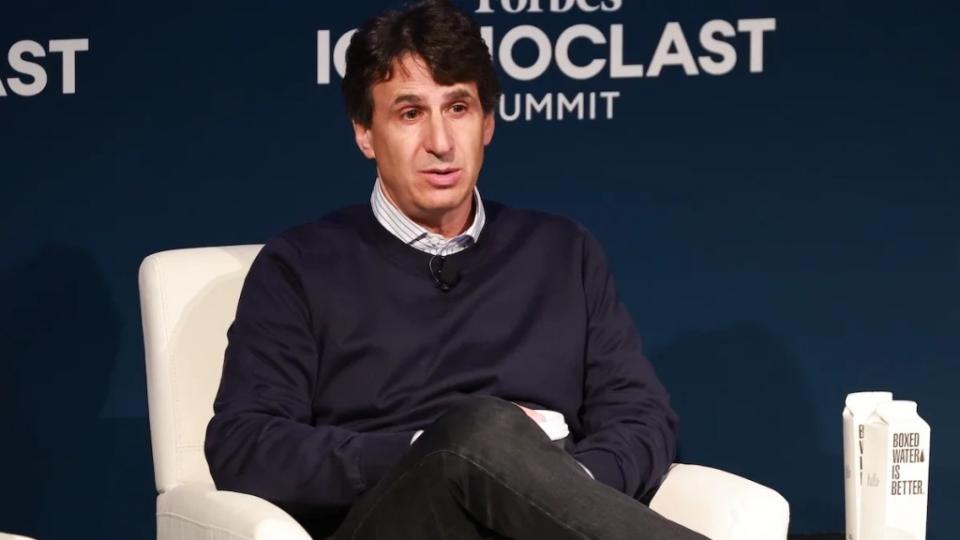Apollo CEO Marc Rowan Shrugs Off Regulatory Concerns Over Paramount Bid: ‘These Paths Are Well Trodden’

Apollo Global Management CEO Marc Rowan is shrugging off potential regulatory concerns around the private equity firm teaming up with Sony Pictures Entertainment on a joint $26 billion all-cash offer to acquire Paramount Global.
Sony Pictures Entertainment is a wholly owned subsidiary of Japanese conglomerate Sony Group Corporation. Additionally, Apollo owns a minority stake in Cox Media Group, which owns 12 local U.S. TV stations in nine metro areas.
The Federal Communications Commission has a 25% investment cap on foreign ownership in a U.S.-organized entity in which holds direct or indirect control in a “U.S. broadcast, common carrier, or aeronautical radio station licensee.” The FCC can grant an exemption to own more than 25% and up to 100% of stock of a U.S.-organized entity that holds a controlling interest in a common carrier or aeronautical radio licensee, unless it finds that such foreign ownership would not serve the public interest.
When it comes to national television ownership, the FCC states there is no limit on the number of television stations a single entity may own nationwide as long as the station group collectively reaches no more than 39 percent of all U.S. TV households.
“Look, regulatory is an issue for every transaction, but these paths are well trodden,” The executive told CNBC’s David Faber on Monday. “Sony already owns a studio. We already own TV stations. The limits on the laws are pretty straightforward.”
When asked about Apollo’s involvement in the Paramount bid, Rowan said that the private equity firm is always interested in “value creation” and “taking something and making it better.”
“You think about industries that have gone through transformation. Media, which you live every day, is in the midst of an amazing transformation. The notion that two studios could potentially come together, historically we would have thought not possible, but you think of all the new competition from streamers from Meta, from Apple and from everyone else, this market is wide open,” Rowan told CNBC’s David Faber on Monday. “Having scale, having the resources to produce content and to do it efficiently, having multiple genres, multiple everything, I think that it’s been an interesting spot for us. We’re active through Yahoo. We’re active through Legendary. We’ve been active in this space before and partnering with a strategic just bring something else to the table.”
While Rowan acknowledged that Apollo is usually brought in for the purposes of financing, he argued that the firm has 35 years of experience in the media industry under its belt.
“We’ve made the mistakes we need to make to pay the tuition,” he added.
Under the terms of the bid, Sony would be the significant majority shareholder of Paramount with operational control, while Apollo would take a minority stake, an individual familiar with the matter previously confirmed to TheWrap. The individual emphasized that the expression of interest is non-binding and that the $26 billion price, which includes the assumption of debt, is a starting point.
“For us, purchase price matters,” Rowan added. “This is all about providing our investors excess return per unit of risk. There is nothing that is worth doing that does not provide a return to our investors.”
Sony and Apollo’s joint bit comes after Paramount’s independent special committee evaluating bids let the exclusivity window on its discussions with Skydance Media lapse with no deal.
While the committee has pushed for further talks with Skydance, the decision to open talks to other bidders gives companies who may have been sitting on the sidelines a chance to make a competing offer.
There’s also a scenario in which Paramount could not accept any bids and choose to go it alone under its new management structure following the resignation of CEO Bob Bakish. Paramount’s Office of the CEO, comprised of CBS CEO and president George Cheeks, Paramount Media Networks CEO and president Chris McCarthy and Paramount Pictures and Nickelodeon CEO and president Brian Robbins, is in the process of putting together a long-term strategic plan for the company.
Paramount, whose market capitalization currently sits at $9.2 billion has seen its shares fall 22% in the past year and 8% year to date. However, the stock is up 19% in the past month and 4% in the past six months.
The post Apollo CEO Marc Rowan Shrugs Off Regulatory Concerns Over Paramount Bid: ‘These Paths Are Well Trodden’ appeared first on TheWrap.

 Yahoo Finance
Yahoo Finance 